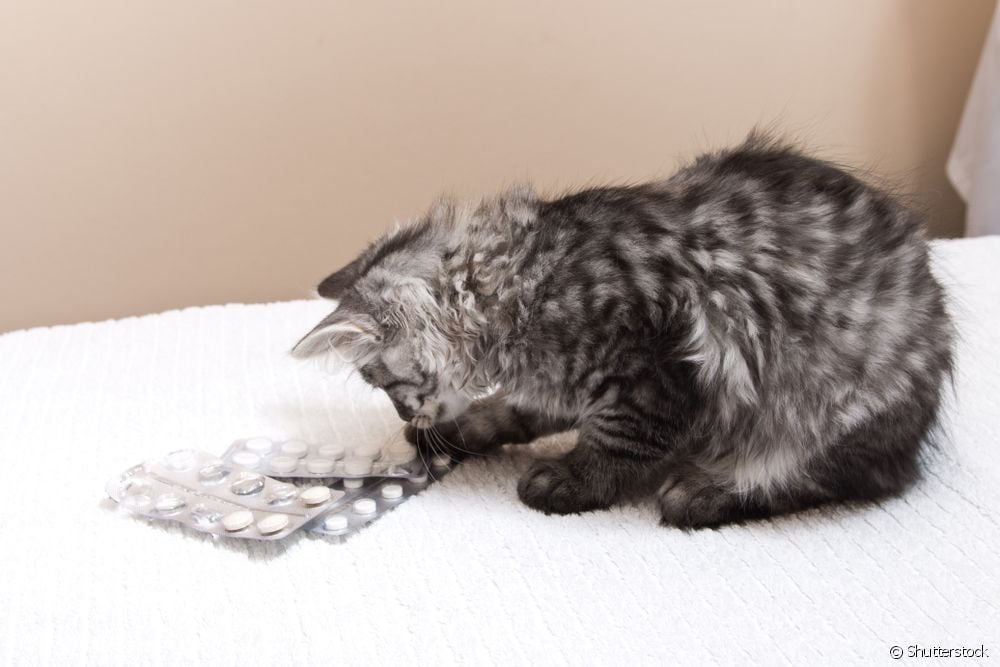What does the kitten deworming schedule look like?

Table of contents
The dewormer for cats protects against health problems caused by worms. An adult animal should be dewormed frequently, but in the case of the kitten this attention is even greater. There is a schedule for deworming the kitten that must be followed to the letter to ensure the health of the animal. However, knowing when to give dewormer to kitten is a very common doubt. To remove this doubt,we have prepared this article for you to better understand the subject and not to make mistakes in the deworming of the newborn cat.
Kitten deworming schedule starts at 15 days of age
The answer to when to give a kitten dewormer varies between 15 and 30 days of life. The first dose should not be administered before this period because the little one's body is not yet ready to receive the medicine and this can be dangerous.
The kitten deworming schedule generally goes according to veterinary recommendation and manufacturer's guidance. Even so, there is an average number of doses, see below:
- First dose at 15 days: offer the booster after 15 days and then offer it once a month until six months.
- First dose at 21 days: there should be a 24-hour interval between the first, second and third dose. Thereafter, applications will be monthly, until the sixth month.
- First dose at 30 days: give one dose every 30 days for six months.
Doses should be applied according to the package insert and usually vary according to the weight of the animal (both for tablets and liquid). Reinforcement also varies according to the manufacturer. It is important to follow the table to the letter to ensure successful treatment and avoid some cat diseases.
From the age of six months, a visit to the vet is essential to evaluate a new deworming schedule. Generally, doses are every six months, but in some cases, it may be necessary to deworm the cat every four months. During the consultation, it may be necessary to perform a blood and stool test for evaluation. Only a veterinarian can indicate the best onemedicine, in addition to the table and dosage.

Vermifuge for kittens should be liquid
The biggest difference between dewormers for adult cats and those for kittens is in the dosage. While the bigger ones can take a pill, it is preferable that the smaller ones receive the liquid medicine (suspension). In addition to facilitating administration, this avoids the risk of wrong dosage. Therefore, it is very important to calculate the weight and the right amount. Another detail to be aware of is the minimum age.Also, avoid offering medicines that are exclusively for dogs. Usually, the worms of each dog are different and, in these cases, the medicine may not work.
Vermifuges for kittens ensure health and development of the feline
Without a dewormer, a kitten is susceptible to a number of problems. Worm infestation is a disease in which parasites lodge in the body and can reach the intestine, stomach and even the heart. There are two types of worms: flat (cestodes) and round (nematodes). Both are extremely harmful, and the symptoms can be silent. When noticeable, a cat with worm infestation usually has..:
- Vomiting;
- Weight loss;
- Lethargy;
- Anemia in cats;
- White worm coming out of the cat;
- Weakness.
In the case of kittens, worms can even hinder their healthy development. Contamination happens through contact with the worm in the environment. It can be contact with faeces, through the flea, interaction with infected animals and contaminated water. To avoid worming in cats, it is essential to keep the environment sanitized and the animal free of fleas. It is also good not to let the cat eatProvide your cat with clean water and keep its drinking fountains, feeding troughs and litter box clean. All of this will prevent your cat from getting ringworm.
See_also: Aegean cat: 10 curiosities to get to know the breedSee_also: Hungry cat: 6 reasons why your pet is always asking for food

